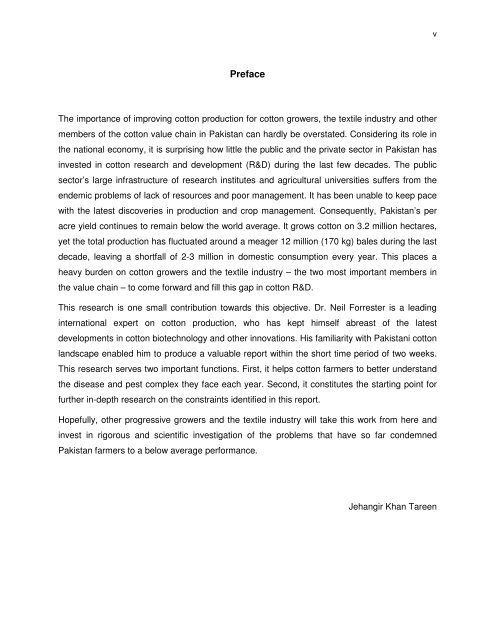ChangingCottonLandscapeNeilForrester
ChangingCottonLandscapeNeilForrester
ChangingCottonLandscapeNeilForrester
You also want an ePaper? Increase the reach of your titles
YUMPU automatically turns print PDFs into web optimized ePapers that Google loves.
Preface<br />
The importance of improving cotton production for cotton growers, the textile industry and other<br />
members of the cotton value chain in Pakistan can hardly be overstated. Considering its role in<br />
the national economy, it is surprising how little the public and the private sector in Pakistan has<br />
invested in cotton research and development (R&D) during the last few decades. The public<br />
sector’s large infrastructure of research institutes and agricultural universities suffers from the<br />
endemic problems of lack of resources and poor management. It has been unable to keep pace<br />
with the latest discoveries in production and crop management. Consequently, Pakistan’s per<br />
acre yield continues to remain below the world average. It grows cotton on 3.2 million hectares,<br />
yet the total production has fluctuated around a meager 12 million (170 kg) bales during the last<br />
decade, leaving a shortfall of 2-3 million in domestic consumption every year. This places a<br />
heavy burden on cotton growers and the textile industry – the two most important members in<br />
the value chain – to come forward and fill this gap in cotton R&D.<br />
This research is one small contribution towards this objective. Dr. Neil Forrester is a leading<br />
international expert on cotton production, who has kept himself abreast of the latest<br />
developments in cotton biotechnology and other innovations. His familiarity with Pakistani cotton<br />
landscape enabled him to produce a valuable report within the short time period of two weeks.<br />
This research serves two important functions. First, it helps cotton farmers to better understand<br />
the disease and pest complex they face each year. Second, it constitutes the starting point for<br />
further in-depth research on the constraints identified in this report.<br />
Hopefully, other progressive growers and the textile industry will take this work from here and<br />
invest in rigorous and scientific investigation of the problems that have so far condemned<br />
Pakistan farmers to a below average performance.<br />
v<br />
Jehangir Khan Tareen


